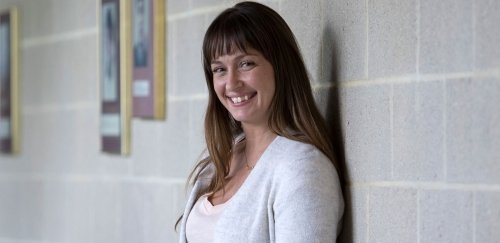MEET OUR GRADUATES: A Grassroots Activist in the R.I. Recovery Community
- News & Events
- News
- MEET OUR GRADUATES: A Grassroots Activist in the R.I. Recovery Community

“After all these years, I’m still on fire about recovery,” says Roxxanne Newman
I’ve been in recovery myself for seven years and have worked on behalf of the recovery community for four,” said Roxxanne Newman. “After all these years, I’m still on fire about recovery, but in different ways. I’m on fire about social justice – racism, poverty and the lack of education that impact whether people reach recovery. I was able to see a lot of that as a result of my education here at Rhode Island College.”
Newman is not only a stellar Rhode Island College student who’s been on the Dean’s List for the past four years, she’s been an active, vocal leader in Rhode Island’s recovery community. Newman graduated with dual degrees in psychology and chemical dependency and addiction studies.
Under the auspices of the Care New England health system, Newman works as a peer recovery specialist in all emergency rooms across the state. She maintains a case load of more than 50 clients and uses her personal experiences with addiction to help her clients transform their lives.
Newman also sits on the executive board for RICares, a grassroots effort to develop ways to ensure that recovery is possible for all Rhode Islanders and to advocate for social justice.
As a scholar and researcher at RIC, Newman is particularly interested in researching barriers to recovery; that is, barriers imposed by stigma and social injustice. The hope is that evidence-based research will inform changes in policies and programs.
“I’m interested in why it is that some people recover and others do not,” she said. “I think society believes that people don’t recover because they’re not doing something right, but I think there’s a lot more to it. I think stigma plays a big part. No one wants to admit that they have a drug or alcohol problem because of the stigma attached to it.” It follows, then, that the fear of being stigmatized might keep an individual away from seeking treatment.
Another barrier to recovery is criminalizing the disorder, she said. “You can’t say on the one hand that addiction is a disease and on the other hand criminalize it. I know there are those who would argue that we’re not criminalizing the disease, we’re criminalizing the behavior that comes with it. But if you understand that addiction is a disease and that people do desperate things under the effects of this disease, then at some point you have to recognize that addiction is a health issue not a criminal issue,” she said.
In examining the criminalization of addiction, Newman noted issues of social justice. She said America’s criminal justice system is disproportionately made up of people of color. When ex-offenders are released from incarceration, many lack adequate housing, education, job training and skills to support recovery. “Social justice is an issue that is very much intertwined and interrelated with addiction and health,” she said.
Newman is a sought-after public speaker. She was asked to present the keynote at R.I. Gov. Gina Raimondo's signing of the executive order for the Governor's Overdose Task Force. She has been the main speaker at some of The Rally for Recovery events. She also spoke on the panel for Patrick J. Kennedy's "The Power of Peers Discussion" and was recently on a panel at Brown University, addressing the need for safe consumption sites in Rhode Island, where drug users are provided sterile injection equipment and receive medical oversight by trained staff to reduce overdose and infectious disease transmission.
She shares with juveniles at the Pawtucket Learning Academy her experience with drug use, the consequences of drug use and the possibility for recovery. And throughout her tenure at RIC, Newman has been president of RICovery, a student organization that provides peer-to-peer support for students either in recovery or who are struggling with substance use.

daughter
In the fall, she will begin work on a graduate degree in psychology at Rhode Island College, with focus on research.
“For Roxxanne, adversity has been a detour and not a wall,” said Professor of Psychology David Sugarman. “This astute, socially aware graduate has seized the opportunities that were availed to her to reshape her life and to better the lives of others. Whether in her scholarship, internship or advocacy, she exemplifies what it means to be a grass-roots advocate for social justice.”
Newman is recipient of the Dorothy Bianco Award (2019), the New England Psychological Association Honorary Undergraduate Scholar Award (2018) and the Rhode Island College Vital Contribution to the Community Award (2018).
